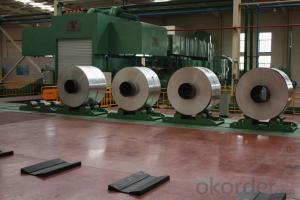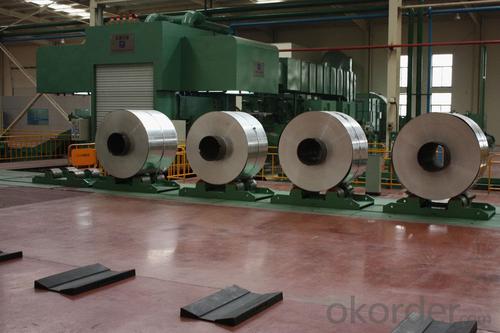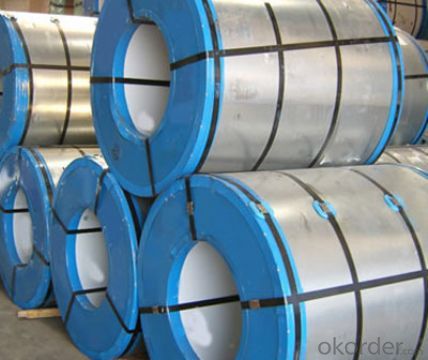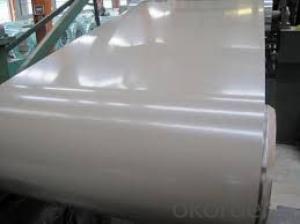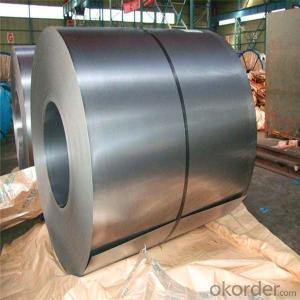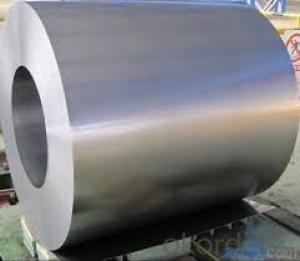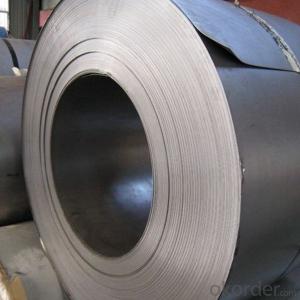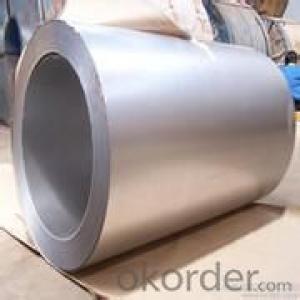Cold Rolled Steel Sheets Coil CRC SGCC,SPCC,SPHC high quality
- Loading Port:
- Tianjin
- Payment Terms:
- TT OR LC
- Min Order Qty:
- 50 m.t.
- Supply Capability:
- 10000 m.t./month
OKorder Service Pledge
OKorder Financial Service
You Might Also Like
SPCC cold rolled steel coil
Product Description :
CRC cold rolled steel coil
1.Standard | JIS, DIN, ASTM |
2.Grade | SPCC DC01 ST12 SAE1008 For more grades,please contact us. |
3.Thickness | 0.4mm-2mm |
4.Width | 1,000mm, 1,200mm, 1,250mm |
5.Place of origin | China |
6.Brand | HUAYE |
7.Model | DC01 |
8.Type | Steel coil and Sheet |
9.Technique | Cold rolled |
10.coil weight | 3tonn-15ton |
11.Application | Constructions, white appliance manufacturing, etc |
COLD ROLLED STEEL COIL
THICKNESS: 0.20mm-1.8mm
WIDTH:1000mm-1250mm
SURFACE: BRIGHT ANNEALED, CUTTING EDGE, MATT FINISH
STANDARD:JIS G 3141 SPCC
COIL ID: 508mm/610mm
COIL WEIGHT:5-10 ton
PACKAGE: COIL TO BE WRAPPED WITH ANTI-RUST PAPER PLUS METAL COVER WORTHY FOR SEA TRANSPORTATION
TERMS OF PAYMENT: 20% ADVANCED PAYMENT BEFORE PRODUCTION,SELLER RELEASE THE SHIPPING DOCUMENTS AFTER RECEIPT BUYER’S 80% PAYMENT
LABEL INFORMATION:As per customer's request.
Our advantage :
1. Expertise:
10 years of manufacture: we know how to properly handle every step of production.
2. Competitive price:
We produce resin and paint by ourself, which greatly reduce our cost!
3. Accuracy:
We have a technician team of 40 people and a QC team of 30 poeple, ensure our products is exactly what you want.
4. Materials:
All color Steel Sheets are made of high-quality raw materials.
5.Certificate:
Our products are certified by TUV, ISO9001:2008,ISO14001:2004 etc.
6. Productivity:
We have three large-scale production line, to guarantee all your orders will be finished in earlist time
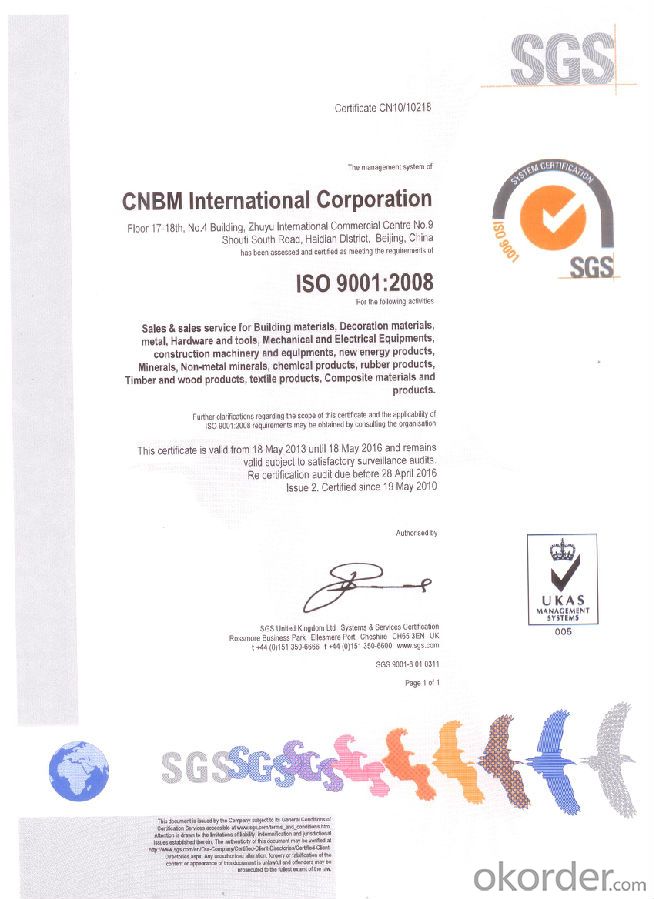
- Q: i was thinking like getting a a steel building for 2 or 3 stall does anyone know how much that would cost? Have anyone used steel building how do you like them etc
- a great style of human beings are putting up those steel homes made by making use of agencies like Cleary or Morton because of the fact they are greater fee effective. yet in my opinion, i don't think of they greater wholesome horses all right. They dent very relatively, all the horse has to do is lean against it somewhat. additionally they provide no insulation so as that they are like little ovens interior the summertime and are fairly chilly interior the wintry climate. in case you're able to have adequate money it, i might flow with a competent previous formed timber barn.
- Q: How are steel coils used in the production of power transmission towers?
- Steel coils are used in the production of power transmission towers because they provide the necessary strength and structural integrity required to support the transmission lines. The coils are formed into various sections and welded together to create the tower's framework, ensuring it can withstand the weight of the cables and withstand external forces such as wind and seismic activity.
- Q: why were guns, germs and steel absent within America?
- i dont really understand this question but if it means to how it was before then it was absent because the native americans were not into technology so they obviously had no guns created that was something that they had traded to get from europe as for the germs i ddo not know about thta really except for if it means that common disease and one of the diseases most used in history books is malaysa from mosquitos but when they had traded with europe they got all sorts of diseases now for steel the only reason i remember them traveling for is for gold and i dont remember them ever looking for it until 13 colonies were established as you can see im not exactly sure about germs and steels but i know that the guns part is correct
- Q: What are the different types of steel alloys used in coils?
- There are several different types of steel alloys commonly used in coils, each with its own unique properties and characteristics. Some of the most common types include: 1. Carbon Steel: This is the most basic and widely used type of steel alloy in coils. It contains a low amount of carbon and is known for its strength and durability. Carbon steel coils are often used in applications where high strength is required, such as automotive parts, construction materials, and machinery components. 2. Stainless Steel: Stainless steel coils are made from an alloy of iron, chromium, and other elements. They are highly corrosion-resistant and have excellent strength and heat resistance properties. Stainless steel coils are commonly used in applications where resistance to corrosion and staining is important, such as kitchen appliances, medical equipment, and transportation components. 3. Galvanized Steel: Galvanized steel coils are made by coating regular carbon steel with a layer of zinc. This coating provides excellent corrosion resistance and protects the underlying steel from rusting. Galvanized steel coils are commonly used in outdoor applications, such as roofing, fencing, and automotive body parts. 4. Alloy Steel: Alloy steel coils are made by adding various alloying elements, such as manganese, nickel, chromium, or molybdenum, to carbon steel. This enhances the strength, hardness, and wear resistance of the steel. Alloy steel coils are often used in applications where high strength and toughness are required, such as in the manufacturing of machinery, tools, and construction equipment. 5. Electrical Steel: Electrical steel coils are specifically designed for use in electrical equipment, such as transformers and electric motors. They have low electrical resistance and high magnetic permeability, allowing them to efficiently conduct electricity and create magnetic fields. Electrical steel coils are typically made from a silicon alloy, which improves their electrical and magnetic properties. Overall, the choice of steel alloy for coils depends on the specific requirements of the application, such as strength, corrosion resistance, electrical conductivity, or heat resistance.
- Q: What are the different types of steel coils?
- There are several different types of steel coils, including hot rolled coils, cold rolled coils, galvanized coils, and stainless steel coils.
- Q: How are steel coils coated for color and aesthetics?
- Color and aesthetics can be added to steel coils through a process known as coil coating. This process involves applying a layer of paint or coating material to the surface of the steel coil in order to enhance its appearance and protect it against corrosion. To start the coil coating process, the steel surface is thoroughly cleaned and pre-treated. This step ensures that the surface is free from any contaminants and provides a suitable base for the coating to adhere to. The pre-treatment process may include cleaning, degreasing, and chemical treatment to improve the adhesion and durability of the coating. Once the surface is prepared, the coil is fed through a continuous coating line. In this line, the coating material, usually a liquid paint, is applied to both sides of the steel coil using various methods such as roll coating, spray coating, or electrostatic coating. The coating material is carefully chosen to achieve the desired color, texture, and durability. After the coating is applied, the coil undergoes a curing process. During this process, the coil is heated to allow the coating material to dry and bond to the steel surface. This ensures a strong and long-lasting finish that can withstand exposure to different environmental conditions. Moreover, coil coating technology allows for additional treatments to enhance the aesthetics of the steel coil. For instance, the coil can undergo embossing, where a pattern is pressed onto the surface, creating a textured or three-dimensional appearance. Additionally, other decorative techniques like printing, laminating, or adding metallic effects can be used to achieve specific aesthetic effects. In conclusion, the coil coating process not only adds color and aesthetics to steel coils but also provides a protective layer that increases their lifespan and resistance to corrosion. This makes them suitable for a wide range of applications, including roofing, automotive parts, appliances, and construction materials.
- Q: I am doing a experiment on mild steel soaked in sodium chlorideanyone can enlighten me about the effect of the sodium chloride in engineering term ?The mild steel specimen which I soaked in the sodium chloride has orange rust on it
- The mild steel contains a lot of Iron. The NaCl solution quickly attacks the iron content and forms rust. Over time, the solution may also cause what is called 'Chloride Cracking' of the steel. Pitting corrosion of stainless steel due to chlorides would certainly produce a rust-colored product. Passivation can be used to maintain a good corrosion resistant surface of stainless steel process vessel. There are many commercial products for this purpose. In the pharmaceutical industry, this process is often called derouging, that is to remove the buildup of iron oxides on the stainless steel process surfaces
- Q: How can I owe a Pre-engineered Steel Building?
- You just have to do small efforts for owing a steel building: Firstly you have to finalize a steel building company for construction work. After finalizing the steel building company, the next step is the paperwork - the agreements and contracts. Some steel building companies may also ask for a verbal approval for the factories to get the work started.
- Q: How are steel coils used in the production of electrical resistors?
- Steel coils are used in the production of electrical resistors as the core material for winding wire around. The coils provide a stable structure, allowing the wire to be tightly wound and creating the necessary resistance for regulating electric current flow.
- Q: Question about steel type used in bridges.?
- It is used for other things besides bridges and that might be a bad use. Corten was used for very tall light standards in the Fort Worth Water Gardens with the clear understanding that it was to be kept dry. As time passed and personnel changed, somebody decided the round base with bolts sticking up was ugly and put dirt and plantings in the basin in the concrete holding the poles. The watering of the plants kept the rust going through the steel and one pole eventually fell, killing two people. The other light poles were removed.
Send your message to us
Cold Rolled Steel Sheets Coil CRC SGCC,SPCC,SPHC high quality
- Loading Port:
- Tianjin
- Payment Terms:
- TT OR LC
- Min Order Qty:
- 50 m.t.
- Supply Capability:
- 10000 m.t./month
OKorder Service Pledge
OKorder Financial Service
Similar products
Hot products
Hot Searches
Related keywords
